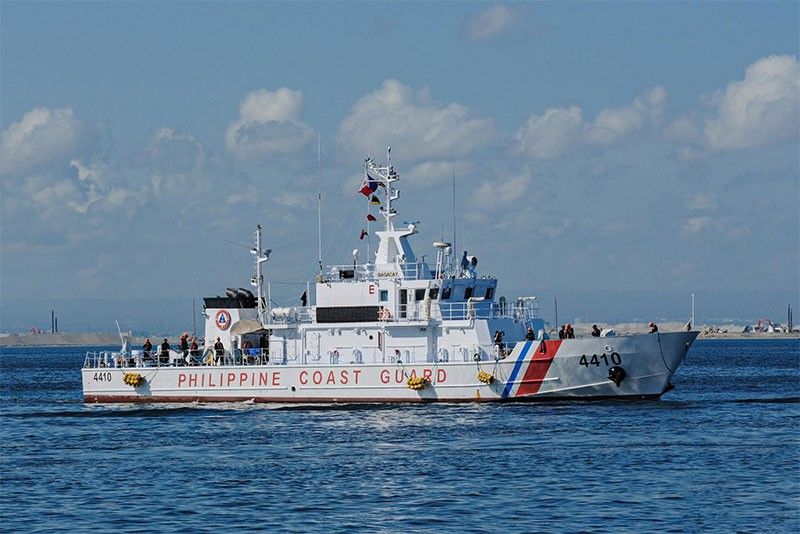Philippines won’t use water cannons, invites China to talks

MANILA, Philippines — The Philippines has no plans of “attacking anyone with water cannons or any other offensive,” President Marcos said yesterday in the wake of the most serious act yet by the Chinese against Filipino vessels in Philippine waters.
Marcos made the remark days after China Coast Guard ships used high-pressure water cannons to try to stop Philippine vessels on routine humanitarian mission to Panatag (Scarborough) Shoal last April 30.
“We will not follow the Chinese Coast Guard and the Chinese vessels down that road,” the President told reporters in an interview in Pasay City.
“What we are doing is defending our sovereign rights and our sovereignty in the West Philippine Sea. And we have no intention of attacking anyone with water cannons or any other such offensive… I would have to call them weapons as these were causing damage already,” Marcos pointed out.
One of his ranking security officials said Beijing should accept the Philippines’ standing invitation to hold the next bilateral consultation meeting if it really is committed to defusing tensions in the West Philippine Sea.
In an interview with “Storycon” on One News yesterday, National Security Council assistant director Jonathan Malaya said China should sit down and talk with the Philippines regarding the recent incidents in the West Philippine Sea.
“We already sent an invitation to China. We urge China to favorably consider the standing Philippine invitations. We ask China: to defuse tension, we are inviting you to the bilateral consultation mechanism,” Malaya said.
The last such meeting was hosted by China in Shanghai last January.
The latest water cannon attack caused severe damage to vessels of the Philippine Coast Guard and the Bureau of Fisheries and Aquatic Resources.
Bajo de Masinloc or Panatag Shoal – located 220 kilometers off Zambales – is a traditional fishing ground of Filipinos, Vietnamese and Chinese, according to the 2016 ruling of the Permanent Court of Arbitration based in The Hague.
The same ruling invalidated China’s massive claims in the South China Sea and reaffirmed Philippines’ maritime entitlements.
The shoal is within the Philippines’ exclusive economic zone under the United Nations Convention on the Law of the Sea or UNCLOS, which sets an EEZ at 200 miles or about 370 km from a country’s coast.
Some quarters have proposed allowing Philippine vessels to retaliate against Chinese water cannon attacks by using their own water cannons. The President is against such proposal.
“Because it is not the mission of the Navy, our Coast Guard to start, or to increase tensions. Their mission is precisely the opposite – it’s to lower tensions,” the Chief Executive said.
Marcos maintained the Philippines would continue to resort to diplomacy to assert its sovereignty over its territorial sea and sovereign rights in its EEZ.
“That’s why, all we do is when our vessels were being hit with water cannons, we send demarche to China and other stakeholders,” the President said.
A démarche is a diplomatic gesture to state a government’s position on an issue or subject.
By ruling out the use of water cannon against the Chinese, Marcos has effectively debunked the pro-China narrative that he is for an escalation of the West Philippine Sea row, according to PCG-WPS spokesman Commodore Jay Tarriela.
“How can the pro-China trolls explain why President @bongbongmarcos Marcos will not allow the PCG to use water cannons if they claim that he wants to engage in war and escalate tension in the West Philippine Sea?” Tarriela said on X.
He pointed out that the mission of the PCG ships is to maintain presence in Philippine waters and assert the country’s sovereignty, sovereign rights and jurisdiction.
“The pro-China narrative of threatening the Filipino people with the possibility of war is simply another example of the lies and misinformation they are spreading to confuse and mislead the Filipino people,” Tarriela said.
“Their true intention is to make us submissive and silent in the face of the illegal presence, provocative actions and bullying tactics of the China Coast Guard and Chinese maritime militia against the Filipino fishermen, the PCG and even the AFP (Armed Forces of the Philippines),” he added.
Disinformation
In his interview with Storycon, Malaya said China’s claim of a “new model” arrangement for resupply missions to Ayungin (Second Thomas) Shoal is a disinformation tactic to divert attention from its recent activities in the West Philippine Sea.
He noted that the embassy made the claim over the weekend following the release of a report regarding the degradation of Sandy or Pag-asa Cay, a group of sand bars within territorial waters of Pag-asa Island.
“This is all part of the Chinese propaganda disinformation operations because this came at the heel of the revelations by the biologists from the UP Institute of Biology that they are doing something in Sandy Cay,” said Malaya.
“They are doing this to hide the environmental degradation that they are doing in Sandy Cay,” he added.
Last Saturday, Jonathan Anticamara of the UP Institute of Biology revealed that the Pag-asa Cays 1, 2 and 3 are “in a degraded state.”
Malaya raised the possibility that China was transforming the maritime feature into another artificial island that it could use as basis for claiming “maritime entitlement” or even challenge the 2016 arbitral ruling that invalidated its expansive claim in the region.
Senators Jinggoy Estrada and Francis Tolentino, meanwhile, voiced their approval of Marcos’ position against the use of water cannon.
“Our Navy and Coast Guard have a crucial duty of safeguarding our territorial integrity and maritime rights. Instead of resorting to retaliatory measures, we will assert our rights through diplomatic means. We have consistently filed diplomatic protests to address China’s aggression within our territorial waters,” Estrada, chairman of the Senate committee on national defense, said.
“We must focus our efforts on ensuring the protection of our territorial and maritime interests by adhering to the principles of the rule of law. This entails the use of diplomatic channels and peaceful means of conflict resolution,” he said.
“By adhering to these principles, we can successfully safeguard our sovereign rights and protect our territorial integrity while maintaining a peaceful and stable environment in the region,” he added.
Tolentino called Marcos’ stand “pragmatic and responsible” and that it was “calculated to maintain the current moral high ground of the Philippines. Whether said decision is ephemeral, only the President could decide.”
Senate Minority Leader Aquilino Pimentel III and Sen. Robin Padilla earlier said PCG ships should be equipped with water cannons so that they can fight back in the event of another water cannon attack by the Chinese.
Pimentel said President Marcos should not have brought in military allies or increased the number of sites for the Enhanced Defense Cooperation if he was really wary of escalating tensions.
The Philippine military is engaged in Balikatan exercises with the US and allies Australia and France.
Unconstitutional
Meanwhile, lawmakers said China’s “new model” or an arrangement for resupply missions to BRP Sierra Madre in Ayungin Shoal is a violation of the 1987 Constitution.
“If ever there is indeed a secret agreement or any type of agreement, assuming for the sake of argument that this is true, I think this will have a constitutional issue,” Rep. Joel Chua of Manila’s third district told a news briefing.
“If indeed there is an agreement that didn’t pass through the Senate, or which the Senate had rejected, then this simply means this is illegal and unconstitutional,” he added.
“This is what has been stated in our Constitution – that it should be concurred with two-third votes in the Senate. If they discussed this only between and among themselves, then there will definitely be a constitutional issue – this is unconstitutional and therefore void,” Chua pointed out.
Rep. Raul Angelo Bongalon of party-list Ako Bicol raised the same position. “I fully agree that this has serious legal implications. If this secret deal with China is not embodied in a written agreement or treaty, then therefore it is void for being unconstitutional,” Bongalon said.
“As mentioned in the Constitution, any international agreement or treaty must be embodied in a written agreement and must be ratified by the Senate. So, if this arrangement is not ratified by the Senate or concurred in, therefore it is not valid,” the lawyer-legislator argued.
“Why? Firstly, because the Filipino people were not properly informed of the details of such. This amounts to gross inexcusable negligence, and it is also tainted with evident bad faith because it is only they who know about it. We are not properly informed,” Bongalon stressed.
He said Filipino fishermen would be affected most if the government allowed the Chinese some form of official control over Panatag Shoal.
“There are serious legal implications and therefore we have to act on it. That’s why we have to know the details, considering that this is a temporary special arrangement. At any time, President Marcos can rescind this because it is not binding to us, it is not binding to the present administration.”
Rep. Zia Alonto Adiong, of Lanao del Sur’s first district, said the issue goes beyond territories.
“I think beyond the legal issues we can see here that this is just one of the tactics of China part two of the propaganda PR of China. I think the Chinese is resorting to different kind of tactics like bullying,” he told reporters covering the House.
“It’s because they (Chinese) understand the importance of propaganda because it puts legitimacy to their illegal claim,” Adiong said. — Cecille Suerte Felipe, Delon Porcalla, Evelyn Macairan
- Latest
- Trending































